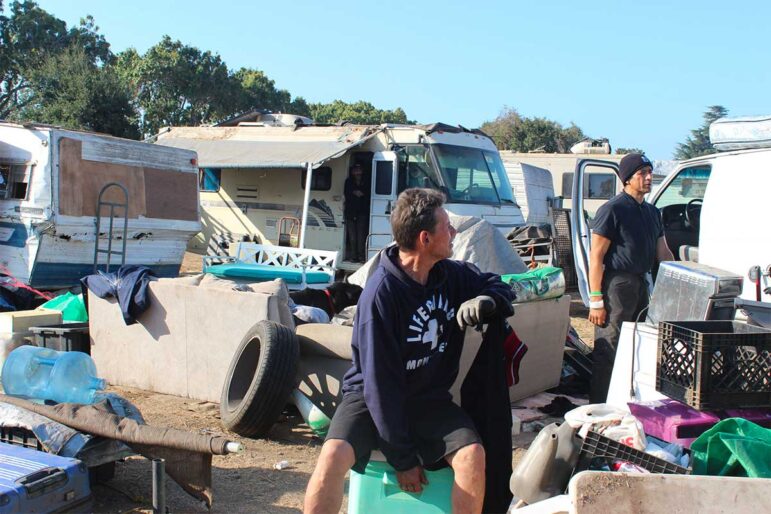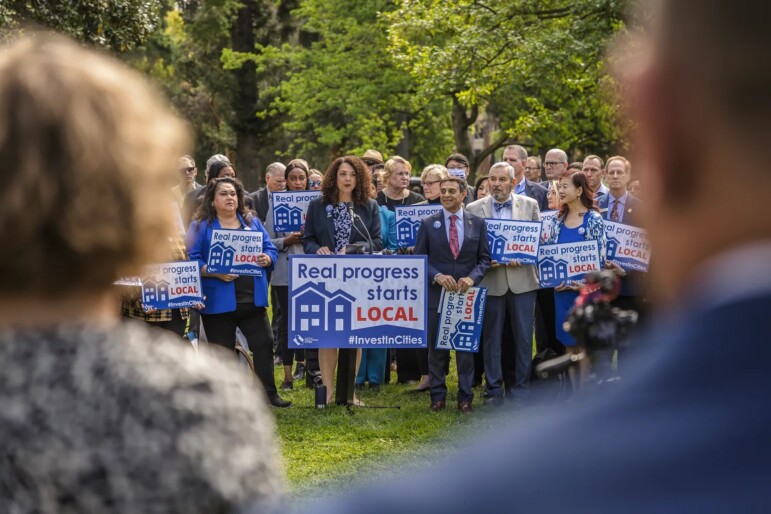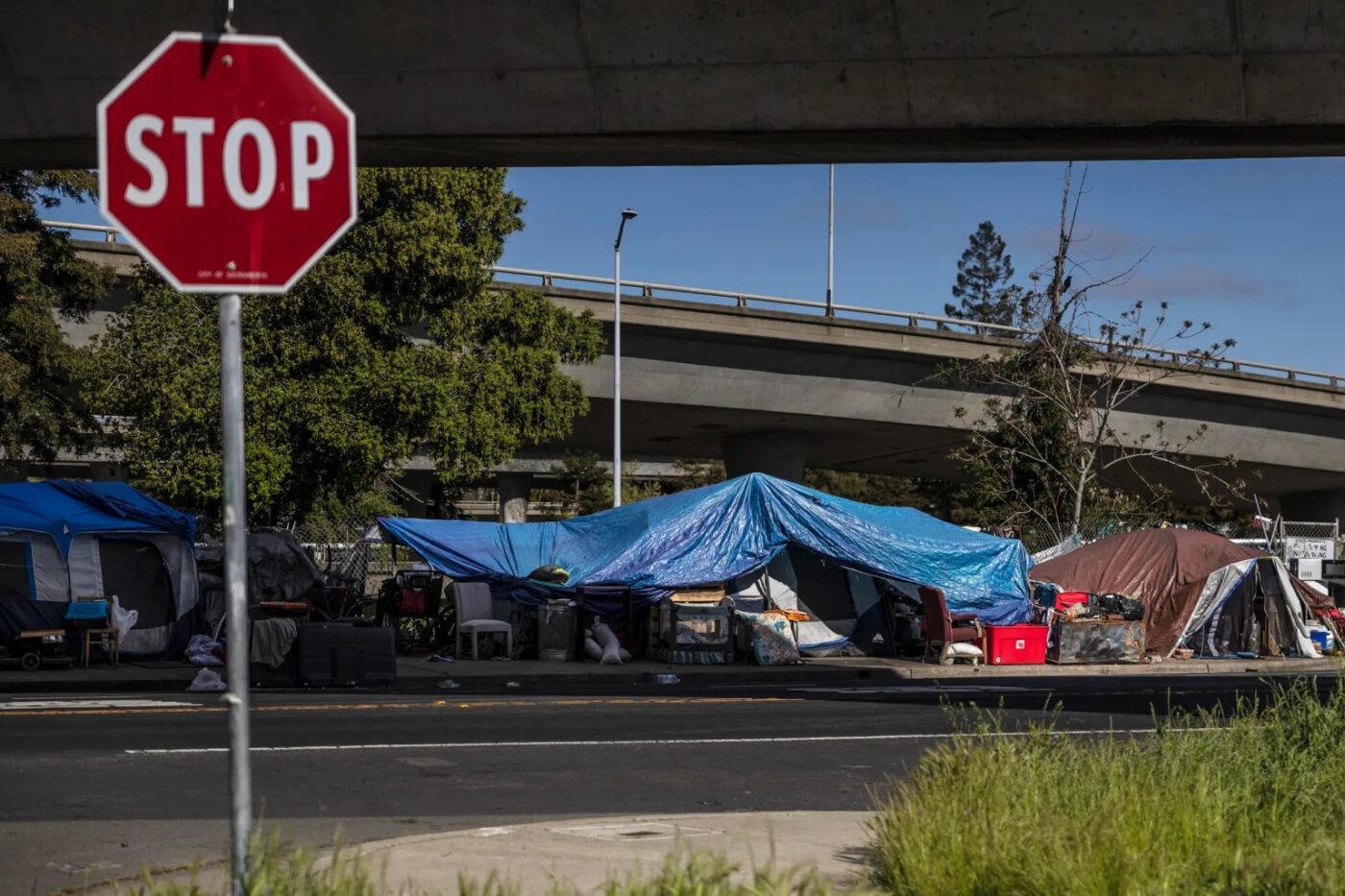The state has spent billions of dollars on homelessness in recent years. So why is the crisis getting worse instead of better?
That’s what a bipartisan group of California legislators is trying to get to the bottom of by calling for a first-of-its kind, large-scale audit of the state’s homelessness spending.
The state has stepped up its involvement and investment in the crisis under Gov. Gavin Newsom’s leadership, allocating $20.6 billion toward housing and homelessness since 2018-19, according to the Legislative Analyst’s Office. But despite the influx of cash, during that time, the number of unhoused people in the state has increased by nearly a third — to more than 170,000 as of last year.
That discrepancy between what’s being spent in Sacramento and what voters see — tent cities in their neighborhoods — has many legislators clamoring for an accounting. They have instructed the state auditor to embark on a sweeping project that will analyze multiple state homelessness programs — as well as focus on homelessness spending in two cities — in an attempt to improve California’s response.
“What we’re doing is not working,” said Assemblymember Josh Hoover, a Republican from Folsom who co-authored the audit request with Democratic Sen. Dave Cortese of Santa Clara County.
“And I think it’s important to get to the bottom of that and figure out where are we investing that is not getting a return on investment. And we need to stop spending money on the programs that are not working.”
The $743,400 audit, approved unanimously in the state’s legislative audit committee last month, will take about 5,000 hours of staff time and is likely to be complete by October, State Auditor Grant Parks said during the hearing. It will scrutinize the cost-effectiveness of as many as five state homelessness programs. The auditor has yet to reveal which ones, but Project Homekey — one of Newsom’s signature efforts to create homeless housing — likely will be one. And the audit will analyze spending in two California cities — San Jose and one other yet to be determined.
The analysis will focus on questions such as: How many people received services between 2020 and 2023? How much funding have San Jose and the other city received, and how has it been spent? How much of that money went toward administrative costs instead of services?
Newsom’s office wouldn’t weigh in on the pending audit, except to issue a statement: “This process is still in its early stages, and we will continue to closely monitor any future developments.”
Myles White, assistant secretary of legislation for the California Business, Consumer Services and Housing Agency, defended the state’s track record during the legislative hearing. “A lot of the progress we’ve made provides a really solid foundation for us to continue in the days ahead,” he said.

San Jose officials said they have used state funds effectively and efficiently, and have been transparent in their work. Local officials rallied at the state Capitol last week, demanding that the state give them an ongoing $3 billion a year to address homelessness.
Cortese began pushing for the audit after touring a massive homeless encampment on vacant land near San Jose’s airport. One of the largest in California, the camp was home to more than 400 people during the pandemic. What he saw shocked and appalled him: “Rodents running around your feet. Massive piles of trash. Tons of broken RVs and abandoned cars. Cars turned upside down with people living inside.”
When Cortese brought up the idea of a state audit, he says local officials told him while they had spent local money, they hadn’t used state funding to improve conditions or offer services at that encampment.
“Which to me just really begged the question: ‘What’s going on?’” Cortese said.
That camp has since been cleared; the Federal Aviation Administration had threatened to withhold airport funds from the city because the camp extended into flight paths. But the city couldn’t move everyone into housing or shelter, and some people have moved to another lot just across the street.
Past attempts at accountability
Cortese’s audit isn’t the first time California’s homelessness response has come under scrutiny. Earlier this year, the Interagency Council on Homelessness found the state spent nearly $10 billion on homelessness between 2018 and 2021 and served more than 571,000 people. But despite that effort, most of those people still didn’t get a roof over their heads.
And in 2021, a state audit of five local governments found that they did not always comply with federal regulations or follow best practices when responding to homelessness.
The new audit will be an “entirely different animal,” Cortese said, as it will go deeper into the state’s spending.
Legislators hope it also will make specific recommendations as to how ineffective programs could be improved or even cut — something the Interagency Council’s report didn’t do.
The heightened scrutiny comes as Newsom has both ramped up spending and rolled out a series of new homelessness programs since the COVID-19 pandemic began. Those include Project Roomkey, which temporarily put elderly and medically compromised unhoused people up in hotels; Homekey, which gives cities and counties money to turn some of those hotels (and other buildings) into longer-term homeless housing; and the Encampment Resolution Grant program, which gives cities and counties money to clear homeless encampments and move occupants into housing and shelters.

It’s no surprise that Republicans would continue their critique of the liberal governor’s spending. But the recent involvement of Cortese and other Democrats signals the politics have shifted.
For example, Assemblymember Luz Rivas, a Democrat from the San Fernando Valley, is pushing her own accountability bill. Assembly Bill 799 would force the state to set specific goals for reducing homelessness, while also allowing funding to be reallocated away from local agencies that fail to meet their goals.
“We get asked by our constituents,” she said. “They ask ‘Where is this funding going to? Is it really being used effectively?’”
Even Newsom himself has advocated for more accountability. He recently began requiring that cities and counties submit “homeless action plans” before receiving state funding, and he briefly held $1 billion hostage after determining the plans they drafted weren’t ambitious enough.
During last month’s hearing, several legislators advocated for the auditor to choose cities in their own districts. Some made pitches for Los Angeles and Sacramento, while others pushed for smaller cities.
Gail Osmer, a San Jose advocate who led Cortese on the encampment tour that inspired the audit, spoke alongside the senator at the hearing. In an interview, she said she hopes the audit’s findings will be a wake-up call for her city.
Osmer has been critical of how the city cleared the airport encampment. Camp residents were promised services, such as free repairs for their cars and RVs, that many people never received, she said.
“People are not held accountable,” Osmer said. “Where’s the money going?”
